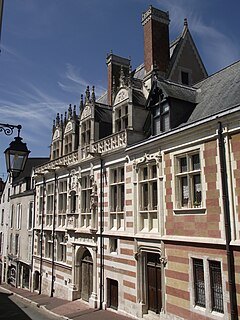Hôtel d'Alluye
| Hôtel d'Alluye | |
|---|---|

Hôtel d'Alluye, seen from the end of the Rue Saint-Honoré in May 2012
|
|
| General information | |
| Architectural style | |
| Address | Rue Saint-Honoré |
| Town or city | Blois |
| Country | France |
| Coordinates | 47°35′16″N 1°19′55″E / 47.58778°N 1.33194°ECoordinates: 47°35′16″N 1°19′55″E / 47.58778°N 1.33194°E |
| Named for | Florimond Robertet's barony of Alluyes |
| Construction started | 1498 (or 1500) |
| Completed | 1508 |
| Client | Florimond Robertet |
The Hôtel d'Alluye is a hôtel particulier in Blois, Loir-et-Cher, France. Built for Florimond Robertet when he was secretary and notary to Louis XII, the residence bears the name of his barony of Alluyes. On Rue Saint-Honoré near Blois Cathedral and the Château de Blois, it is now significantly smaller than it was originally as the north and west wings were destroyed between the seventeenth and nineteenth centuries.
Built between 1498 (or 1500) and 1508, the hôtel particulier is one of the first examples of Renaissance architecture in Blois. Its façades consist of Gothic, French Renaissance and Italian Renaissance architecture. The Hôtel d'Alluye was owned by the Robertet family from 1508 until 1606 before undergoing frequent changes in ownership; since 2007, it has been divided into ten apartments and a large office.
As a result of its ownership changes the building has been considerably altered, with only the east and south wings retaining their original appearance. Destruction of the west wing began during the seventeenth century, and the north wing was destroyed in 1812. The Hôtel d'Alluye was classified as a monument historique on 6 November 1929, and its courtyard has been open to the public on European Heritage Days since 2011.
Built near Blois Cathedral and the Royal Château de Blois, the Hôtel d'Alluye is located on Rue Saint-Honoré. Its south side originally extended along Rue Saint-Honoré between the current No. 4 and No. 10, and its west side extended along Rue Porte-Chartraine. Records indicate that the north side was extended to Rue Beauvoir in 1643, enlarging the hôtel particulier over a large quadrangle 30 m (98 ft) wide.
...
Wikipedia
